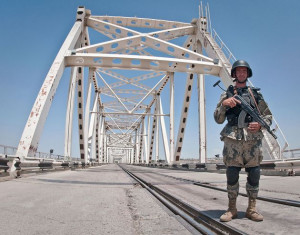
We are talking here about the draft Bilateral Security Agreement between the U.S.A. and Afghanistan, which, according to the plans of the White House, should come into effect by the beginning of 2015 and remain in force until 2024, and possibly longer. This agreement, at the insistence of Washington, provides sufficiently broad powers to American military that will remain in the country – about 15,000 soldiers. This deal will allow the Pentagon to “administer as it sees fit” nine major military bases in Afghanistan, located in eight different regions of the country. In particular, we are talking about the Bagram Air Base (north of the capital), Kandahar and Shorab (in the south), Shindand (near the western border with Iran), Jalalabad and Gardez (on the eastern border with Pakistan), as well as simplified access to the international airports in Kabul, Herat, Mazar-i-Sharif and a number of other strategic facilities.
This document also provides for the military infrastructure currently under the control of the USA, to remain under American control – now and in the future. Military equipment and American planes will not be inspected by Afghan authorities and U.S. military personnel will have full immunity, and cannot be detained or arrested if they commit crimes.
It should be noted that this last point, stipulating that U.S. troops in Afghanistan will not be under local legal jurisdiction, was one of the most keenly discussed items by both parties. This is because civilians in Afghanistan very often become victims of U.S. airstrikes and Kabul wanted to have the right to legally prosecute members of the ISAF (International Security Assistance Force), responsible for the deaths of civilians, insisted on such trials being conducted in their home countries.
The obvious purpose of this Bilateral Security Agreement is to strengthen Washington’s dominant role not only in Afghanistan, but also in maintaining permanent American military footholds in this strategically important region, which includes the south of Russia, China, Iran, and the oil-rich Caspian basin. That is the task the Pentagon set for itself at the time it was preparing for the invasion of Afghanistan in 2001.
Of course, when considering this agreement, official Kabul was forced to give up its national sovereignty. However, on the other hand, refusing to do so, would lead to a complete withdrawal of American troops, which would be fraught with negative consequences for the present government, the danger of civil war breaking out in the country and the fall of the current administration. After all, Afghanistan today is fully dependent on foreign military and economic aid, without which Kabul cannot feed itself or maintain its own army.
However, at the same time, in Afghanistan anti-American sentiments are growing. Protest more and more frequently are springing up on the streets of many cities, attended by Afghans dissatisfied with Washington’s policies and unwilling to sign any agreement that would allow U.S. troops to remain in Afghanistan. Growth of such hostility is being fueled by numerous incidents involving American soldiers killing Afghan women and children, the abuse of Afghan prisoners, burning hundreds of copies of the Koran at the U.S. military base in 2012, etc.
Hopelessness of the administration in Kabul under the current situation was fully understood in Washington, which allowed the Americans to assume tougher positions in recent days, and put pressure on the Afghan side – thus forcing back all attempts by Karzai to achieve favorable conditions for Afghanistan. In particular, despite Karzai’s precondition of having the White House provide an official apology for the deaths of innocent Afghan civilians during attacks by U.S. drone planes, Obama refused to make such a move. Instead, the next day, Obama sent to the Afghan President a letter, after the U.S. Secretary of State confirmed progress on the compromise agreement with Kabul. In this letter, in particular, the U.S. president reiterated Washington’s desire to “respect Afghanistan’s sovereignty” and promised that the U.S. military would not conduct massive raids as it did before, of course if there “did not arise any emergency circumstances threatening the security of American citizens”.
In these difficult conditions for official Kabul, and in order to “share responsibility with the people” to address the very sensitive issues for Afghans, Karzai brought the security agreement with the United States up for discussion to the Council of Elders – the Loya Jirga, which convened on November 21. Traditionally, this council is convened to discuss the most serious issues, and consists of 2,500 tribal elders, clerics and politicians, being the embodiment of the supreme will of the Afghan nation, a body that is very difficult for country’s parliament to circumvent.
However, despite the preliminary agreement reached with the Americans, Afghan President Hamid Karzai, in turning to the Loya Jirga, urged the Council to postpone the adoption of the strategic and military cooperation pact with the United States until after the presidential elections, which are scheduled for April 2014. Due to the fact that Karzai himself, who has been in office since 2004, cannot constitutionally run for another (third) time and take part in these elections, this move by the Afghan president is seen, of course, as his desire to “pass the buck” on this very complex issue to his successor.
In these circumstances, Washington is now clearly forced to strengthen its pressure on Kyrgyzstan to safely maintain their military position, if not in Afghanistan, than at least in that Central Asian state, to ensure the implementation in the future the Pentagon’s military and strategic plans in the region.
Valery Kulikov, political analysts, specially for the online magazine New Eastern Outlook.
